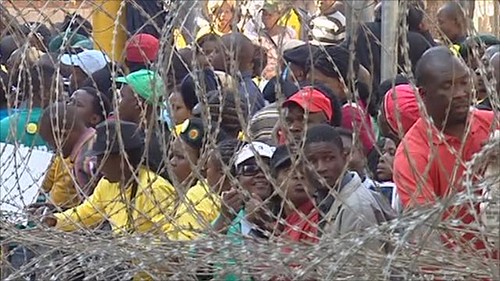
Demonstrations took place outside the ANC Youth League disciplinary hearings on August 30, 2011. Julius Malema, the president of the ANCYL, was the subject of the hearing., a photo by Pan-African News Wire File Photos on Flickr.
ANC and the liberation question
Wednesday, 11 January 2012 10:05
Tanzania Citizen
Professor Baregu lectures at Saut,
Mwesiga Baregu, Dar es Salaam
The African National Congress of South Africa (ANC) is marking its Centenary this year. This is an appropriate occasion on which to reflect on the original aims and goals as well as the accomplishments and challenges facing the party. Not only that but it also presents an opportunity to reflect upon the sister organisations which, together with the ANC, formed a closely knit Southern African Liberation Movement from the 1960s to the early 1990s.
These included Namibia’s South West Africa People’s Organisation (Swapo), Mozambique’s Front for the Liberation of Mozambique (Frelimo), Angola’s Popular Movement for the Liberation of Angola (MPLA), Zimbabwe African National Union (ZANU), Zimbabwe African People’s Union (ZAPU).
Together, these organisations were, in most case, recognised by the OAU and even the UN as the ‘sole and authentic representatives’ of their people.
This recognition, though perhaps well intended at that time, has been the source of some of the problems that have arisen in the post-liberation or democratisation period.
This is reflected, in particular, in the intolerance of political dissent within the organisations and the reluctance to promote inclusive political participation and contestation in their political systems.
In a paper published about 10 years ago, I made the following observations on the general features of national liberation movements. I reproduce them below in an effort to provide a framework for understanding the contemporary challenges facing these movements in their metamorphosis from liberation movements to ruling parties.
The liberation struggles were epochal and global.
They were essentially waged against colonial oppression and imperialist domination. National self-determination, democracy and independence were the ultimate goal.
The fight against imperialism was the unifying force between the movements across the continents, linking the oppressed peoples in their struggles against a common enemy.
The implication of this was that the success of these struggles would be partly measured by the extent to which they were able to contribute towards the weakening and ultimate defeat of imperialism as a system of global political domination and economic exploitation.
Despite the fact that all national liberation struggles were anti-imperialist in essence, they had to comprehend their concrete historical conditions and take them into account, particularly in defining the goals of the struggle, and devising appropriate strategies and tactics.
This would depend on the nature of oppression and exploitation in each situation. Settler colonialism, for example, was the dominant form that this oppression and exploitation assumed in southern African countries. Hence the land question being primary.
That armed struggle is always on the agenda since it arises from imperialist aggression, intransigence and impunity of the oppressor. It is the violence of those obstructing change that induces the taking up of arms by the oppressed and makes armed struggle necessary as a means to liberation. Armed struggle is never an end in itself.
Peaceful means and negotiation strategies are viable under certain conditions. Imperialist forces or those forces generally opposed to the goals of the liberation struggle however, may invoke negotiations for different reasons.
These may include buying time in which they can continue the oppression and exploitation, improve their bargaining or fighting capacity, weaken the liberation armed struggle, or precipitate dissention in the movements, particularly between the armed and political wings of the movements.
Taking this into account, liberation forces are advised to use negotiations to raise the premium of armed struggle by fighting while negotiating.
Armed struggle was not to be sacrificed at the altar of peaceful negotiations. The strategy should be to shorten the period of armed struggle by intensifying the war, mobilising the masses behind the movement’s negotiation goals, and undertaking the commitment to create the necessary conditions for socio-economic reconstruction (transformation) and democracy.
Looking back over the last 30 or so years, it would seem that the outcomes of the liberation struggles have been rather uneven. In relation to the four parameters of anti-imperialism, socialism, armed struggles and peaceful settlements, it appears that outcomes have been determined by concrete historical and conjunctural conditions in specific countries, rather than ideologies.
Whereas remarkable progress has been made in southern Africa, Asia and Latin America, there are still pockets of protracted old struggles, such as the struggles in Palestine and Western Sahara alongside new struggles in Iraq and Afghanistan.
Imperialism, which was the target and unifying factor among the liberation movements, seems to have taken on new, more aggressive and violent forms, having supplanted the socialist world as we knew it then.
Old struggles against imperialism, such as in Cuba and North Korea, persist alongside emerging anti-imperialist forms of struggle reflected in the growing social movements against globalization. The conversion of armed struggles into peaceful settlements under various Western-sponsored negotiation processes in southern Africa is giving rise to renewed struggles to complete ‘unfinished business’ or ‘second liberations’ in Zimbabwe, Namibia, South Africa, Angola and Mozambique.
The question that springs to mind is: How long can the peaceful settlements last without meeting the aspirations of the liberation movements and the expectations of the people? We will turn to that question next week.
Professor Baregu lectures at Saut
No comments:
Post a Comment